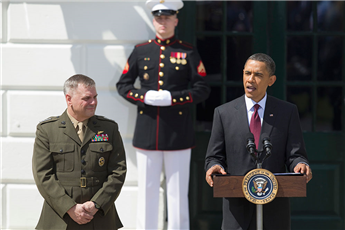Over 200 Ex-Generals and Admirals Say Iran Deal Risks War
IBDEditorials.com

Joint Chiefs Vice Chairman
Gen. James Cartwright appears with President Obama
during an event for the Wounded Warrior Project in
Washington on May 4, 2015. AP
Iran Deal: At least 214 former generals and admirals signed a letter warning that President Obama's Iran nuclear pact could bring war. It counters less than a quarter of that number publicly supporting the deal.
President Obama claims that the opponents of his surrender to Iran are neocon warmongers, "the same people who argued for the war in Iraq."
But the 214 and counting retired military brass who signed an open letter to the leaders of both parties in the two houses of Congress, urging rejection of the agreement, belie that claim. And their emergence upends a previous letter supporting the deal, signed by a fraction of this number of generals.
One of the signatories of that earlier letter, retired Joint Chiefs member Marine Gen. James Cartwright, was close to Obama and is now the subject of a federal investigation into whether he leaked national security secrets to the media.
Those signing the letter opposing the deal include Air Force Gen. Lance Smith, a decorated combat fighter pilot who was NATO's Supreme Allied Commander for Transformation; Air Force Gen. James Davis, who was chief of staff for the Supreme Headquarters of the Allied Powers, Europe; and the organizer of the letter, decorated Navy combat aviator and former vice chief of naval operations, Adm. Leon "Bud" Edney.
Their missive blasts virtually everything that Obama and Secretary of State John Kerry assert about the consequences of the deal.
"Removing sanctions on Iran and releasing billions of dollars to its regime over the next ten years is inimical to the security of Israel and the Middle East," the 214 generals and admirals argue.
Contrary to the assertion by the president that the deal cuts off "every pathway" that Tehran could take to become a nuclear weapons power, the ex-brass point out that even if the terrorist regime doesn't cheat, Tehran gets to keep "all the infrastructure the Iranians need for a nuclear bomb to be preserved and enhanced . .. Iran is allowed to: continue to enrich uranium; develop and test advanced centrifuges; and continue work on its Arak heavy-water plutonium reactor."
The deal's "unverifiable" inspection scheme is "under such severe limitations as to prevent" inspectors "from reliably protecting Iranian cheating," with the United Nations' International Atomic Energy Agency denied access "to Iranian military facilities, the most likely location of their nuclear weapons development efforts."
The letter's signers also raise a key matter that has been little raised in the debate on the pact: the compromise of U.S. secrets in the process of enforcing the agreement.
They argue, "There is substantial risk of U.S. intelligence being compromised, since the IAEA often relies on our sensitive data with respect to suspicious and/or prohibited activity."
One top of the at least $150 billion that Tehran will have to expand its terrorist activities in the region, the generals' letter notes that the deal "will lift international embargoes on Iran's access to advanced conventional weapons and ballistic missile technology."
Rather than provide the opportunity for Iran to begin a process of becoming a more normal, civilized country, as the administration suggests, the letter says, "The agreement will enable Iran to become far more dangerous, render the Mideast still more unstable and introduce new threats to American interests as well as our allies."
They write that rather than prevent war, the agreement "makes it likely that the war the Iranian regime has waged against us since 1979 will continue, with far higher risks to our national security interests."
Plainly, as the military officials suggest, the so-called deal with Iran to curb its nuclear weapons program is a travesty, one that endangers America and its allies.
The Obama surrender isn't a choice between war
and peace. As these 214 generals and admirals state,
it's between the current jihad and an unthinkable
nuclear jihad.

